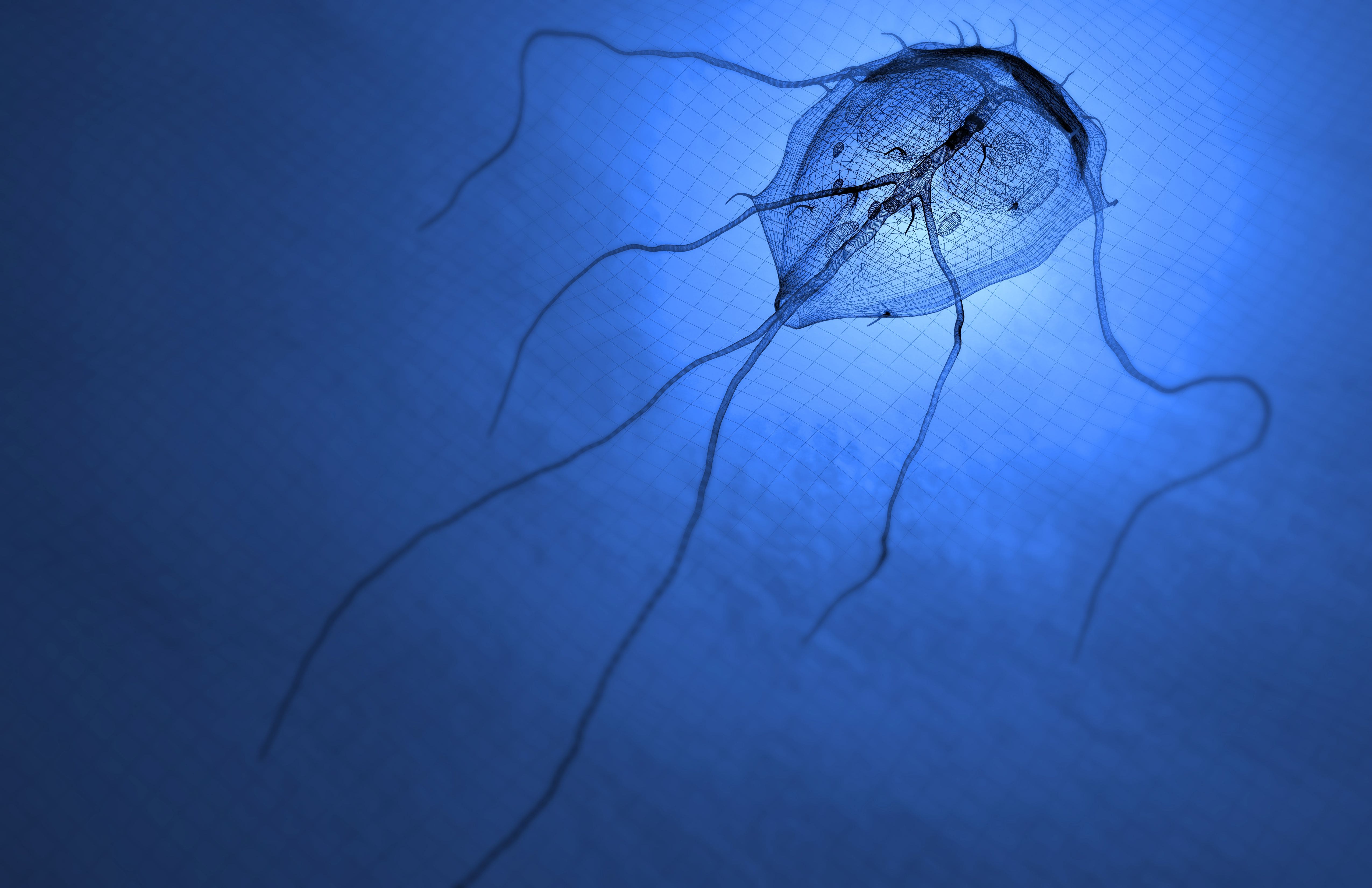
Have you ever heard of Giardia? This tiny parasite may be out of sight, but it's certainly not out of mind for millions of people and pets who suffer from its effects each year. Giardia causes giardiasis, a common illness that affects your stomach and intestines, leading to uncomfortable symptoms like diarrhea, cramps, and bloating.
But here's the thing: Giardia spreads so easily that anyone can catch it—whether at home, in public, or while traveling. The good news? With the right information and prevention steps, you can protect yourself and your loved ones from giardiasis.
Important Note: This article is for educational purposes only and should not replace medical advice. Always consult a health professional for your health concerns.
What is Giardia?
Giardia (pronounced gee-ar-dee-uh) is a microscopic parasite that lives in water, soil, and on surfaces. It can infect humans and animals like dogs and cats. When someone drinks or eats something contaminated with Giardia, the parasite enters their body and causes an infection called giardiasis.
Giardiasis isn't just a problem for humans—it also affects pets, especially dogs. The illness can lead to serious discomfort and, in some cases, complications if not treated. Giardia is one of the most common waterborne parasites worldwide.
If you think giardiasis is something you don't have to worry about, think again! Studies estimate that about 200 million people are infected every year globally.
How Does Giardia Spread?
Giardia spreads easily, making it one of the most common causes of stomach-related illnesses. Here's how it happens:
-
Contaminated Water
Giardia thrives in water that hasn't been treated properly. This includes lakes, rivers, pools, and even drinking water if it's not filtered or boiled.
-
Person-to-Person Contact
If someone with giardiasis doesn't wash their hands well after using the bathroom, they can spread the parasite to others. This is why giardiasis outbreaks are common in places like daycare centers and schools.
-
Infected Pets
Pets like dogs and cats can carry Giardia. If your furry friend gets sick and has diarrhea, they could pass the parasite to you, especially if you handle their waste without proper hygiene.
-
Food and Surfaces
Unwashed fruits, vegetables, or dirty kitchen surfaces can also harbor Giardia. Eating contaminated food or touching infected surfaces can quickly spread the parasite.
Symptoms of Giardiasis

Giardia doesn't always make people or pets feel sick right away. In fact, some people may carry the parasite without showing symptoms. But when symptoms do appear, they can be pretty unpleasant:
Giardia in Humans
- Diarrhea: This is the most common symptom.
- Stomach Cramps: Pain in your belly that comes and goes.
- Bloating and Gas: Feeling uncomfortably full or gassy.
- Fatigue: Feeling tired and weak.
- Nausea: Some people may feel like throwing up.
For some people, these symptoms can last weeks if untreated, leading to weight loss and other long-term issues.
Giardia in Dogs
Dogs are particularly susceptible to Giardia, especially if they drink from contaminated water sources like puddles, lakes, or streams. Puppies and dogs with weaker immune systems are at higher risk.
- Watery or Smelly Diarrhea: A common sign of giardiasis in dogs.
- Weight Loss: Infected dogs may lose their appetite and shed weight.
- Lethargy: Your dog may seem more tired than usual.
- Dehydration: Diarrhea can lead to severe dehydration, which can become life-threatening if untreated.
What to Do
If your dog shows any of these symptoms, take them to the vet immediately. Giardia can be diagnosed through a stool sample, and treatment usually involves medications like fenbendazole or metronidazole.
Pro Tip: Always pick up after your dog and avoid letting them drink from outdoor water sources to minimize their risk of infection.
Giardia in Cats
Though less common than in dogs, Giardia can also infect cats. Outdoor cats and kittens are more vulnerable because they're more likely to come into contact with contaminated water or surfaces.
Symptoms in Cats
- Diarrhea: Often pale, greasy, or foul-smelling.
- Weight Loss: A noticeable drop in your cat's weight.
- Lethargy: Your cat may be less playful or seem unusually tired.
- Poor Coat Condition: Infected cats may have dull or matted fur.
What to Do
If your cat shows signs of giardiasis, visit your veterinarian. Stool tests can confirm the infection, and your vet will prescribe medications to clear the parasite. It's also important to keep your cat's litter box clean and disinfect it regularly to prevent reinfection.
Pro Tip: Keep your cat indoors and provide fresh, clean water to lower their chances of exposure to Giardia.
Don't wait for the symptoms to worsen—early detection and treatment can make all the difference. Our 30-Day Parasite Cleanse Plan is designed to help you regain control of your health.
Diagnosing and Treating Giardiasis
If you suspect you or your pet might have giardiasis, getting a proper diagnosis is the first step.
Diagnosis
Doctors or vets will typically test a stool sample to check for Giardia. Sometimes, multiple tests are needed because Giardia can be hard to detect.
Treatment for Humans
The most common treatments are medications like metronidazole or tinidazole, which kill the parasite. Staying hydrated is also essential since diarrhea can lead to dehydration.
Treatment for Pets
For dogs and cats, vets may prescribe medications like fenbendazole. Make sure to clean their living areas and wash your hands after handling them.
Preventing Giardia at Home and Beyond
Giardia is sneaky, but you can outsmart it with some simple precautions.
At Home

- Boil or Filter Your Water: Especially if you rely on well water or travel to areas with untreated water.
- Wash Your Hands: Before eating, after using the bathroom, and after cleaning up after pets.
- Clean Surfaces: Use disinfectants to clean high-touch areas in your home.
In Public Spaces
- Avoid swallowing water from pools, lakes, or hot tubs.
- Wash fresh produce before eating.
- Dispose of pet waste properly—never leave it lying around.
While Traveling
- Drink bottled water or use a portable water filter.
- Avoid ice cubes or raw food in places with questionable sanitation.
Don't Miss Out: Staying one step ahead of parasites is easier than you think. Our 30-Day Parasite Cleanse Plan can help you maintain a healthy gut, even when life gets busy!
Why Staying Informed Matters
Understanding Giardia isn't just about avoiding a stomachache. It's about protecting your health, your family, and even your pets. When untreated, Giardia can lead to severe complications, especially for young children, older adults, and those with weak immune systems.
By learning how to spot the symptoms and taking steps to prevent it, you're taking control of your health—and that's empowering.
Conclusion
Giardia may be small, but it has a big impact on millions of people and pets each year. By understanding how it spreads, recognizing the symptoms, and knowing how to prevent it, you can keep yourself and your loved ones safe.
Don't Wait—Act Now! Start protecting your health today with our 30-Day Parasite Cleanse Plan. This easy-to-follow program is designed to help you cleanse your body, boost your immune system, and feel your best.
Remember, this information is for educational purposes only. Always consult with a healthcare professional if you have health concerns.
Quick Takeaway
- Giardia is a tiny parasite that spreads through contaminated water, food, and contact with infected people or pets.
- Symptoms include diarrhea, stomach pain, and fatigue in humans and pets.
- Preventing Giardia is simple—wash your hands, boil your water, and keep your pets healthy.
- Take charge of your health today with our 30-Day Parasite Cleanse Plan!


